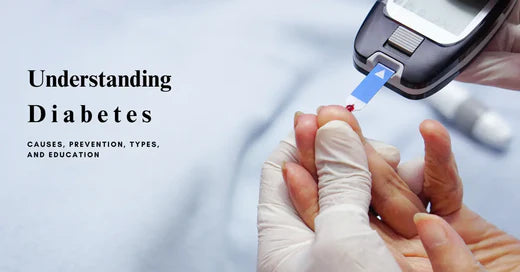
Understanding Diabetes: Causes, Prevention, Types, and Education
Share
Diabetes is a chronic disease which is spreading rapidly affecting millions of people every day. The World Health Organisation defines diabetes as a condition where the pancreas either doesn’t produce enough insulin or the body can’t effectively use the insulin it makes. The hormone insulin helps control blood sugar levels. When diabetes is not managed, high blood sugar (hyperglycemia) can occur, which can seriously harm the body’s systems, particularly the nerves and blood vessels.
As per an Indian Council of Medical Research (ICMR- INDIAB) study published in 2023, the prevalence of diabetes is 10.1 crores in Indians. Researchers said they found it higher than the previous estimate. In this blog, we are going to explore the causes, prevention, types, and importance of awareness needed to educate people on the rising threat of diabetes.
Table of Contents
Key facts:
- A Lancet study estimates that 11.4% of the population is living with diabetes.
- Lancet's study warned of a sharp increase in diabetes in states like Uttar Pradesh, Madhya Pradesh, Bihar, and Arunachal Pradesh, where the impact was lower.
- In the study by the Lancet Group, it was found that diabetes was more frequent in urban than rural areas.
What causes diabetes?
Diabetes may seem complicated, but understanding its causes can help you manage it better. Let’s dive into what leads to this condition.
How to prevent diabetes: Measures You Can Take

Preventing diabetes might sound daunting, but with a few simple lifestyle changes, you can significantly reduce your risk. Let’s explore some practical steps you can take to stay healthy.
- Maintain a Healthy Diet: Focus on a healthy diet rich in protein, fruits, vegetables, and whole grains. Avoid sugary drinks and processed foods.
- Regular Exercise: 30 minutes of moderate physical activity most of the week. Activities like walking, cycling, and swimming can help maintain a healthy weight and improve insulin sensitivity.
- Healthy Weight: It is found in research that obesity leads to diabetes. Reducing weight can significantly lessen the risk of acquiring diabetes.
- Stay Hydrated: Drinking plenty of water instead of sugary beverages. Some studies have found that drinks which are high in fructose fasten insulin levels which is dangerous for type 2 diabetes.
- Avoid Smoking: Smoking increases the risk of diabetes and other serious health conditions. Quitting smoking can improve health and reduce the risk.
- Limited Alcohol Consumption: Alcohol consumption should be in moderation. Excessive alcohol consumption can lead to weight gain and increase the risk of type 2 diseases.
- Regular Check-Ups: Visit your doctors regularly to monitor your blood sugar levels and overall health. Early detection and management of prediabetes can prevent the progression of diabetes.
- Manage Stress: Chronic stress can affect blood sugar levels. Engage in stress-relief activities such as yoga, meditation, or deep breathing exercises.
- Get Enough Sleep: Ensure getting enough rest by aiming for 7 to 8 hours of sleep each night, as inadequate sleep can impact insulin sensitivity and blood sugar levels.
- Educate Yourself: Understanding diabetes and its risk factors can empower you to make healthier choices and take control of your health.
Living with diabetes

Living with diabetes requires a proactive and balanced approach to managing the condition effectively. Daily routines often include monitoring blood sugar levels, taking medications or insulin, and making mindful choices about diet and exercise. While it can feel overwhelming at times, many people find that establishing a routine helps.
Finding the Right Support System
The support system of family, friends, and healthcare professionals is necessary. They can provide encouragement and practical assistance, making it easier to stick to a management plan. Staying informed about the condition and being open to learning new strategies can also make a big difference.
Emotional health is just as important as physical health when managing diabetes. It’s normal to feel frustrated or stressed, but finding healthy ways to cope, such as joining a support group or talking to a counsellor, can be beneficial. With the right tools and support, people with diabetes can live full, active lives, pursuing their goals and dreams while keeping their health in check.
Conclusion
Diabetes arises from insufficient insulin production or ineffective insulin use, leading to serious complications if not managed. Key causes include genetics, lifestyle choices, and autoimmune responses. Preventing diabetes involves a healthy diet, regular exercise, weight management, and staying hydrated.
Living with diabetes means establishing routines for monitoring blood sugar, taking medications, and making mindful choices. Support from loved ones and healthcare professionals is crucial, as is managing stress and emotional health. With the right care and education, people with diabetes can lead healthy, fulfilling lives.
Frequently Asked Questions
Q. What is diabetes?
Diabetes is a disease that occurs when the pancreas does not produce enough insulin or when the body cannot use the insulin produced by it. The main causes of diabetes vary, but in common, they lead to increased blood sugar.
Q. What causes diabetes?
Various factors depend on the causes of developing diabetes. A few of them are:
- Genetic factors: Family history and genetics can increase the risk of developing diabetes.
- Insufficient Insulin Production: Insufficient insulin production by the pancreas affects blood sugar regulation.
- Hormonal Changes: Conditions like polycystic ovary syndrome (PCOS) and hormonal imbalances can affect insulin effectiveness.
- Medical Condition: Certain health issues, such as high blood pressure and high cholesterol, are linked to a higher risk of diabetes.
Q. How many types of diabetes are there?
- Type 1 diabetes is a condition where the body attacks insulin-producing cells. Requires daily insulin.
- Type 2 diabetes, the most common, is linked to lifestyle factors. And managed with diet, exercise, and medication.
- Gestational diabetes occurs in pregnancy and resolves after birth. Increase future diabetes risk.
- Prediabetes is higher than normal blood sugar level, a warning sign for potential type 2 diabetes. And requires lifestyle changes.
Q. Will I need extra support, and where can I get it?
Managing diabetes can be demanding sometimes. If you have diabetes, additional support from healthcare professionals, support groups, and loved ones can offer guidance on managing medications, monitoring blood sugar levels, and making lifestyle adjustments. Support groups provide emotional support and practical tips from others facing similar challenges. Family and friends can offer encouragement and help maintain a healthy routine.
